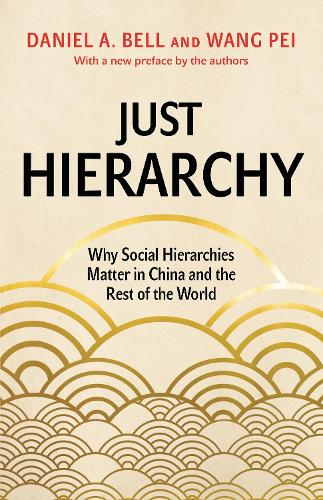
Just Hierarchy: Why Social Hierarchies Matter in China and the Rest of the World
(Paperback)
Available Formats
Publishing Details
Just Hierarchy: Why Social Hierarchies Matter in China and the Rest of the World
By (Author) Daniel A. Bell
By (author) Wang Pei
Princeton University Press
Princeton University Press
10th May 2022
United States
Classifications
Tertiary Education
Non Fiction
East Asian and Indian philosophy
Political science and theory
Far-left political ideologies and movements
Left-of-centre democratic ideologies and movements
Politics and government
302.35
Physical Properties
Paperback
296
Width 140mm, Height 216mm
Description
A trenchant defense of hierarchy in different spheres of our lives, from the personal to the political
All complex and large-scale societies are organized along certain hierarchies, but the concept of hierarchy has become almost taboo in the modern world. Just Hierarchy contends that this stigma is a mistake. In fact, as Daniel Bell and Wang Pei show, it is neither possible nor advisable to do away with social hierarchies. Drawing their arguments from Chinese thought and culture as well as other philosophies and traditions, Bell and Wang ask which forms of hierarchy are justified and how these can serve morally desirable goals. They look at ways of promoting just forms of hierarchy while minimizing the influence of unjust ones, such as those based on race, sex, or caste.
Which hierarchical relations are morally justified and why Bell and Wang argue that it depends on the nature of the social relation and context. Different hierarchical principles ought to govern different kinds of social relations: what justifies hierarchy among intimates is different from what justifies hierarchy among citizens, countries, humans and animals, and humans and intelligent machines. Morally justified hierarchies can and should govern different spheres of our social lives, though these will be very different from the unjust hierarchies that have governed us in the past.
A vigorous, systematic defense of hierarchy in the modern world, Just Hierarchy examines how hierarchical social relations can have a useful purpose, not only in personal domains but also in larger political realms.
Reviews
"Some of the most impressive parts of their book, which is written in the form of a lively conversation with plenty of provocative examples, compel the reader to understand the cultural value of hierarchy in Asian societies. . . . Regardless of whether you agree with it and especially if you dont it is important to understand Chinas case against participative political equality."---Rana Mitter, Financial Times
"Finally, all human affairs are conducted through hierarchies, real or imagined, and for good or evil. So, we must understand them and chart our path carefully through that entangled landscape. Bell and Pei tell us that such a map will be multi-dimensional, drawing upon a variety of human traditions, practices and the findings of science. This book depicts such a journey of exploration, with each chapter focusing on one part of the terrain. As with all such ventures, forays in some directions will not be successful; others might unveil further mysteries or confusions, whilst just a few might indeed be truly illuminating. The patient traveller can look forward to a gripping experience and some deep insights, but he will have work to do when he gets homehow will our nations and societies implement those findings and harmonise them with others The real journey starts there."---Ravi Bhoothalingam, China Report
"Bell and Wang want us to acknowledge that beneficial hierarchies exist. And our job is to make use of them where appropriate to make a more just world. For as the authors take pain to insist, hierarchies exist no matter what, and it is our job as citizens to insist that they be the types that promote compassion and protection of the vulnerabledare I say even economic justicerather than those that do not."---Leanne Ogasawara, The New Rambler Review
"This well-organized and well-written book raises important questions concerning the nature of social hierarchies worldwide, but especially in China and in relation to Eastern philosophical traditions including Confucianism, Buddhism, and Daoism. . . . Just Hierarchy is highly recommended for both disciplinary and interdisciplinary college courses, and will be an important acquisition for most academic libraries." * Choice Reviews *
"Might Chinas meritocratic system, and its implicit commitments to hierarchy, be the secret of its extraordinary success. . . Daniel Bell and Pei Wangs Just Hierarchy is a colorful exploration of the moral justifications behind elements of Chinas success."---Chang Che, Los Angeles Review of Books
"[W]ritten in crystalline, engaging prose. . . . [Just Hierarchy] makes the most compelling case ever made in English for a Confucian reform of social and political values in China and perhaps elsewhere."---James Hankins, American Affairs
"There is little doubt that, despite the restrictions imposed by living in an increasingly illiberal authoritarian state, the hearts of the authors of Just Hierarchy are in the right place. Everyone recognizes that our world is defined by hierarchies, regardless of our rhetoric. Millennia of Confucian thought have attempted to humanize and moderate those hierarchies, precisely to protect the most vulnerable and make moral the most powerful."---Michael Auslin, Law and Liberty
"Just Hierarchy is an original and bold project."---Elena Ziliotti, Res Publica
"Daniel Bell and Wang Peis Just Hierarchy: Why Social Hierarchies Matter in China and the Rest of the World provides a comprehensive and thought-provoking justification for hierarchy, a concept that has been given virtually no attention in recent political science and political theory."---Sungmoon Kim, Perspectives on Politics
"Bell and Wangs Just Hierarchy is a remarkable contribution to the newly emerging world order, which necessitates expanding the mutual understanding and moving away from Eurocentric socio-cultural prejudices."---Dr. Mge Yce, The Rest Journal
"[An] ambitious and daring intellectual endeavor."---Shanruo Zhang, Journal of Chinese Humanities
Author Bio
Daniel A. Bell is dean of the School of Political Science and Public Administration at Shandong University in Qingdao. His previous books include The China Model (Princeton). Wang Pei is assistant professor at the China Institute at Fudan University in Shanghai.
